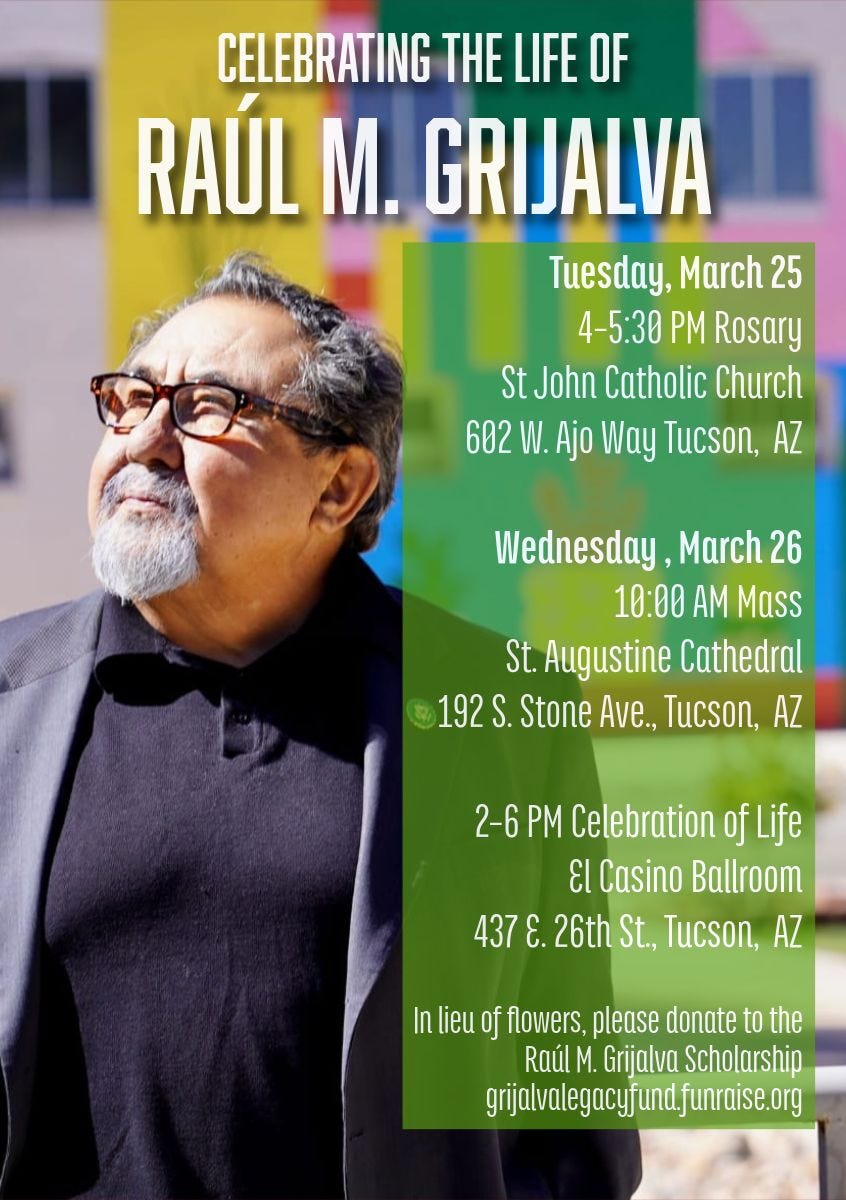The post-414 Council meeting
Any takers? ... Homelessness at the council and courts ... And budgetary hunger.
The potential guest list at today’s Tucson City Council meeting might be the most interesting part of the event.
As you might recall, minutes after Proposition 414 results came out, Tucson Mayor Regina Romero issued a challenge to the opponents of the failed half-cent sales tax measure: Come to City Hall today with their own plans to address Tucson’s biggest problems.
“The No campaign believes they have a better solution, I say, let’s see it,” she wrote on Facebook. “Our next budget discussion is on Tuesday, March 18.”
It’s unclear whether anybody from the Tucson Metro Chamber, the Southern Arizona Leadership Council, the Pima County Republican Party or apparently, Turning Point USA, will show up today, despite signals from Romero and other Democrats on the Council that they were willing to listen to their ideas.
The grassroots No Prop 414 Coalition, which ran an independent campaign not affiliated with the Chamber-backed effort, said they would offer their ideas during the call to the public.
“We look forward to finding ways to shift funding within the FY 2026 budget, working with the city on a different tax proposal, and even more long-term or creative revenue stream solutions. We are genuinely looking forward to working alongside the city to get Tuconans' [sic] needs met,” the coalition said in an emailed statement.
We wrote last week that the post-Prop 414 reality is going to put the Council in a tight spot financially, with the state Legislature tying the city’s hands on how to raise revenues. (To be fair, several of the anti-Prop 414 groups want the city to cut spending, instead of raise it, and redirect those dollars to the police and fire departments.)
A DOGE-like city department isn’t going to be created anytime soon, but we here at the Tucson Agenda will keep a close eye on the city’s budget in our recurring Bite-Sized Budgeting column.
Criminalizing camping in washes
The Council also will discuss criminalizing camping in washes and “watercourses” today.
The item is related to a concerted effort by Tucson City Attorney Mike Rankin to review and amend city ordinances to minimize legal exposure to potential Proposition 312 lawsuits.
Prop 312 requires local governments to reimburse property owners for money they lost due to unenforced public nuisance laws – basically, homelessness. Voters approved it last November.
While the Council is expected to approve the law criminalizing sleeping in washes inside the city limits, don’t expect a task force from the Tucson Police Department to be on standby to clear every single wash in Tucson.
“Not every violation of these ordinances will result in an enforcement action or citation, because the City simply does not have the resources (including the personnel resources) to respond to every violation or reported violation,” Rankin wrote.
Slightly mysterious updates
We expect some interesting conversation about the city’s unsheltered homeless population and the Fentanyl/Opioid public health crisis, as well as updates from staff on recent federal/state legislation today.
Staff reports were virtually nonexistent as of our Monday night deadline, once again reaffirming that Lin Manuel Miranda gives great advice for covering local government.
No one really knows how the game is played
The art of the trade
How the sausage gets made
We just assume that it happens
But no one else is in the room where it happened
Joe will be there today to let you know what the Council decides about their $2.4 billion budget, including how the sausage gets made.
We’re always trying to be in the room where it happened. If that’s what you want from your local news, why not upgrade to a paid subscription today?
Pima County Supervisor Adelita Grijalva announced funeral arrangements for her father on Monday, adding that they were looking into streaming options.
The city put up its independently audited financial report (AFR) for the FY23/24 budget last week, which will be part of today’s budget discussion.
The Russian proverb “trust but verify” fits here as these reports are the single best resource to figure out how much your local government – including the City of Tucson – spent last year.
We’ve used this space to talk about adopted budgets and amended budgets, but those only tell you how much individual departments/divisions/offices of elected officials can spend in any given budget year.
How much they actually spent is another matter entirely, but it’s usually in these AFRs.
We’re still digging through this 236-page report, but here are some of the more interesting tidbits about last year’s budget:
The city gave Pima County $750,000 for the Pima Early Education Program scholarships (PEEPs) program. It provides free preschool education to income-eligible families. The money paid for scholarships for five schools in the city limits.
There are community groups giving an unknown amount to the city to help keep transit free. In an overview of the city’s transit system’s finances, city staff wrote there was funding that included "contributions by local organizations to continue the free fare ridership."
The city has a $1.1 million “credit” with Rio Nuevo. When the city sold a parking lot to Rio Nuevo back in 2016, it reduced the city’s annual liability for the adjacent properties to a contracted amount of $285,000 a year. In 2019, the city prepaid that amount and six years later, it has a credit with the taxing district.
Governors at bat: The death of Congressman Raúl Grijalva is already sending shockwaves through the political landscape of Southern Arizona. It’s also a big deal in Congress, where the GOP maintains a narrow majority and every seat counts. Gov. Katie Hobbs quickly called a special election for Grijalva’s seat in a heavily Democratic district, and Florida Gov. Ron DeSantis did the same for two Republican districts. But Texas’ Republican Gov. Greg Abbot is debating whether to delay calling a special election in a Democratic district, and Democrats in New York are wondering whether to do the same thing about a vacancy in a Republican district, the New York Times reported.
Candidate comments: The Tucson City Council should think twice before they criminalize sleeping in washes and parks, Sadie Shaw, a Tucson Unified School District Governing Board member and candidate for the Council seat in Ward 3, told the Tucson Sentinel’s Jim Nintzel. Shaw says the city is “at a turning point” and the Council needs to make “thoughtful, effective decisions” that don’t just create new problems.
“Instead of addressing the root causes of homelessness, this change will only push those people onto sidewalks and into neighborhood alleys, creating an even bigger public safety and health crisis,” Shaw said.
Get ready for a thousand-front argument: The Trump administration is developing a plan to build affordable housing on federal land, which could have a big impact on Arizona and other states with huge amounts of federal land, the Wall Street Journal reported. Nothing has been set yet, but the idea is to transfer or lease the land to local governments, although some could be sold to private developers.
Literary addition: A new bookstore is coming to the MSA Annex, This is Tucson’s Pascal Albright reports. Desierto Books is planning to open at the end of the month and start celebrating the Southwest’s literary tradition, as well as bring rare first editions to local collectors.
While Joe was reading (and rereading) the city’s budget documents, he got hungry.
Sleepy? Sure. But hungry? That’s new.
We’re pretty sure a well-meaning city staffer went above and beyond when building the 236-page report and decided to freshen up the blank pages with something visually interesting.1
Hence the 11 pages of food porn scattered throughout the document, highlighting our city of gastronomy. Below is page 225, set aside for the glossary.
P.S. Last year’s audited financial report had a Reid Park Zoo theme.













Poll idea! What should the next City of Tucson audited financial report theme be?